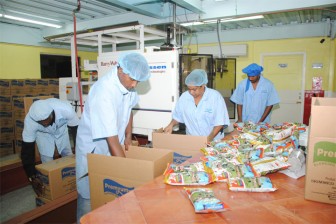With packaging and promotion continuing to prove a challenge to efforts by local enterprises to expand their market share in the region as much as in North America and Europe, Associated Packers Incorporated (API) has taken a small but significant step to begin to raise standards.
On local supermarket shelves packages of full cream and skimmed Premyum milk are, in terms of presentation, indistinguishable for the imported brands. Since last October, the company, a subsidiary of De Sinco Trading has been testing its new brand in local supermarkets and Mahendra Jaikaran, API’s Chief Executive Officer and a shareholder in the company says the steady growth in sales reflects an encouraging consumer acceptance of the product. Jaikaran has become sufficiently confident in the quality of what API has to offer to begin to seek out distributors in the region. Next week he travels to Trinidad and Tobago to test the product on the market there.

API’s $300 million investment is run from a factory located at 47-48 Industrial Site, Eccles, East Bank Demerara. The operation is run by a staff of 28 and goes beyond simply packaging and reselling milk. The milk is imported from New Zealand and repackaged under API’s own brand and it is the process of packaging that is the company’s primary selling point.
When Stabroek Business visited API’s Eccles operations last week Jaikaran was clearly benefiting from the support of his 18-year-old daughter, Cassandra, a post-CXC Bishops’ High School student who was more than holding her own as the company’s stand-in marketing functionary. It was she who had telephoned and invited the Stabroek Business to look at the company’s operations.
API’s $50 million Barry-Wehmiller Haysen Packaging Machine is probably its most important piece of inventory. The state-of-the-art packaging plant, the first
of its kind to be imported into Guyana, allows the company to package milk under conditions that ensures the quality of the product is not compromised. It has the capacity to package 120 400-gramme sacks of milk per minute.
Milk retailed in local markets and groceries is imported in 25kg or 55lbs bags which are then opened by the retailer and sold to consumers in smaller quantities in transparent plastic bags. Exposure to light during the re-selling process significantly reduces the nutritional value of the milk. API’s machinery and its strict phyto-sanitary regimen have enabled the company to meet international standards for the packaging of milk. The commodity is transferred from the opaque packages in which it is imported into the packaging room inside a darkened and sanitized loading area equipped only with a single ultra violet lamp. Thereafter, it is completely concealed from light up until it arrives at the area where it is poured into packages ready for distribution.
Jaikaran says that the packaging machine and coupling equipment has been constructed in a manner that allows for disassembling, sanitizing and cleaning at intervals.
API came into being after De Sinco Trading identified manufacturing and packaging as areas of opportunity. Prior to the startup of the company in November 2007, Jaikaran served as marketing director at De Sinco.
Before implementing its milk-packaging operation, the company had pursued the packaging of rice. Jaikaran explains that while the company was awaiting the take off of its milk-packaging initiative, it undertook other distribution pursuits, purchasing and re-selling shortening, margarine, yeast and other food products. While its value-adding equipment allows it to continue to package and distribute rice and wheaten flour under the brand name Nutrafarm, Jaikaran says that API is now focused on marketing its Premyum milk.
API has secured brand acceptance for its packaged milk at most local supermarkets and Jaikaran accepts that consumer acceptance of the product will take time. Apart from the competition which the new product faces from other imported packaged milk, Jaikaran accepts that “people usually do not change their brands that easily. It’s a process.” Confidence in the brand is leading to an increasingly aggressive marketing programme, which he says will be accelerated in the period ahead.
When Stabroek Business visited API’s Eccles factory the company was preparing 50-gramme-sample packages of full-cream milk for distribution to schools and convalescent homes and similar-sized packages of skimmed milk to introduce in local gymnasiums.
To accelerate the marketing programme Jaikaran has recruited a marketing team of four sales representatives and four support staff to promote the product countrywide. The company’s sales representatives traverse the country’s coastline, while outlets in the hinterland region are supplied by large wholesalers who benefit from volume discounts, special offers and credit facilities as rewards for their roles in the supply chain. API sales representatives’ visits are monitored through customer visitation documents administered by the management team.
Jaikaran says that as API grows its management team is becoming increasingly aware of the importance of protecting the reputation of its products. He challenges consumers to compare both the product quality and the packaging of API products with similar locally produced and imported products. “Our focus is on enhancing consumer confidence in the products that we have to offer,” he says. “Part of the challenge lies in product selection. We need to ensure that the products we distribute live up to the reputation that we seek for our brands.”





